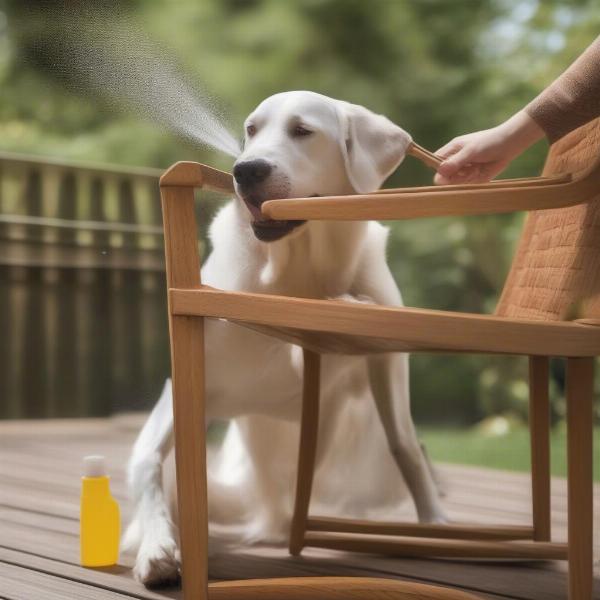Stopping your dog from chewing on everything in sight can be a real challenge. Many commercial deterrents exist, but creating a homemade spray to keep dogs from chewing can be a cost-effective and often safer alternative. This article explores various homemade spray recipes, why dogs chew, and how to effectively use these sprays as part of a broader training strategy.
Understanding Why Dogs Chew
Before diving into homemade solutions, it’s crucial to understand why dogs chew. Puppies explore the world with their mouths, much like human babies. Adult dogs may chew due to boredom, anxiety, teething, or simply because it feels good. Identifying the root cause is essential for choosing the right approach. For instance, a bored dog might benefit from more toys and exercise, while an anxious dog might need calming aids or professional behavior modification.
Effective Homemade Spray Recipes to Deter Chewing
Several homemade sprays can deter chewing. These leverage scents dogs typically dislike, such as citrus and bitter apple. Here are two popular recipes:
Citrus Spray
- Ingredients: Peels of oranges, lemons, or grapefruits, and water.
- Instructions: Boil the peels in water, let cool, strain, and pour into a spray bottle. This spray is safe for most surfaces but test on a small, inconspicuous area first.
Apple Cider Vinegar Spray
- Ingredients: Equal parts apple cider vinegar and water.
- Instructions: Combine in a spray bottle and shake well. The strong smell of vinegar is usually off-putting to dogs. Like the citrus spray, test on a small area before widespread use.
 Xịt dung dịch chống chó cắn lên đồ đạc
Xịt dung dịch chống chó cắn lên đồ đạc
How to Use Homemade Sprays Effectively
Simply spraying and hoping for the best isn’t enough. Here’s how to integrate these sprays into a successful training plan:
- Identify Chew Targets: Observe your dog and pinpoint the items they tend to chew.
- Consistent Application: Spray the targeted items liberally and reapply regularly, especially after cleaning or rain.
- Positive Reinforcement: When you catch your dog chewing on an appropriate item like a toy, praise and reward them. This reinforces good behavior.
- Provide Alternatives: Offer a variety of appealing chew toys to keep your dog occupied and satisfied.
- Supervision and Redirection: Supervise your dog, especially when they are young or new to your home. If you see them about to chew on something inappropriate, redirect them to a chew toy.
Addressing Underlying Issues
Remember, chewing can be a symptom of an underlying issue. If your dog’s chewing is excessive or destructive, consult a veterinarian or a certified professional dog trainer. They can help you determine the cause and develop a tailored behavior modification plan. Sometimes, chewing can indicate a medical condition, so a vet check is always a good starting point.
Conclusion
Homemade sprays can be a valuable tool in your arsenal to deter unwanted chewing, offering a natural and affordable alternative to commercial products. Remember, however, that they are most effective when combined with consistent training, positive reinforcement, and addressing any underlying anxiety or boredom. By understanding your dog’s chewing behavior and taking a holistic approach, you can create a harmonious and chew-free environment for both of you.
FAQs
- Are these sprays safe for my dog? Yes, the ingredients in these recipes are generally safe for dogs. However, always test on a small area first and avoid spraying directly into your dog’s face or eyes.
- What if the spray doesn’t work? Not all dogs react the same way to these sprays. You may need to experiment with different recipes or consult a trainer for alternative strategies.
- How often should I reapply the spray? Reapply the spray regularly, especially after cleaning or if the scent fades.
- Can I use essential oils in my homemade spray? While some essential oils are safe for dogs, others can be toxic. Consult your veterinarian before using essential oils in a homemade spray.
- My dog is chewing excessively, what should I do? Excessive chewing can indicate an underlying medical or behavioral issue. Consult your veterinarian or a certified dog trainer for guidance.
- How can I make chewing more appealing to my dog? Offer a variety of chew toys with different textures, flavors, and sizes. Rotate toys regularly to keep your dog interested.
- Is it normal for puppies to chew a lot? Yes, chewing is a natural behavior for puppies, especially during teething. Provide them with plenty of appropriate chew toys and redirect them when they chew on inappropriate items.
ILM Dog is your go-to resource for expert advice on dog care and training. We offer a comprehensive range of information on dog breeds, health, nutrition, behavior, and much more. Whether you’re a seasoned dog owner or just starting out, ILM Dog is here to help you navigate every aspect of dog ownership. Contact us at [email protected] or +44 20-3965-8624 for personalized guidance. Visit ILM Dog for more helpful tips and resources.